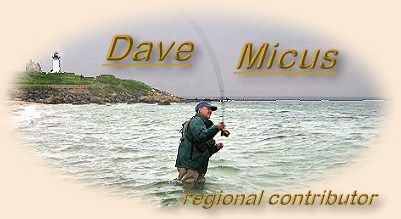|
The big, two-handed rod came into my custody
through what can only be called harmonic
convergence. I acquired quite a few Orvis
gift certificates (legally), and, simultaneously,
received the Orvis Sale Paper, which listed
two-handed rods at a significantly reduced
price. I called and they had one left. No
matter what you call this-- fate, destiny,
karma-- it can't be ignored. I placed my
order and became the proud owner of a
12.5-foot-8-weight-two-handed rod.
I'd been interested in a two-handed fly rod
for striper fishing, salt water being one of
those fishing situations where the longer you
cast, the more fish you'll catch, and I had
the opportunity to ask Lefty Kreh about using
a two-hander. Lefty is someone who seems to
maintain a youthful exuberance about all aspects
of fishing, so much so that a cynic like me
wonders if, at least some of it, isn't an act,
but Lefty's eyes sparkled when I mentioned the
two-handed rod. "You'll love it," he said
excitedly, and proceeded to give me a quick
lesson on casting the rod, waving an invisible
two-hander as eagerly as an adolescent boy strums
an air guitar.
Now I'm a fair to middlin' caster, able to throw
a lot of line on a good day but also still prone
to making beginner casting mistakes, and if I were
to get a personalized license plate it would be
"tailnloop," so I didn't expect miracles when I
broke out the big rod. My trepidations were
unfounded; the thing was a cannon and within a
day I was not only throwing the entire line but
also 15 feet of backing.
This wasn't due to any innate skill on my part,
but the mechanics of the cast. The rod is,
after all, a lever, and to (overhand, not spey)
cast the two-handed rod, you merely hold it by
the upper grip with one hand, and drive the cast
with your other hand by pulling or pushing on the
lower grip. It really is that simple. In physics,
levers are designated as first, second or third
class, and a two-handed fly rod is a perfect
example of a first class lever, the rod being
the lever and the right hand/arm being the fulcrum.
Holding the right arm somewhat rigid and below
shoulder level keeps the arc of the rod in that
mythical 11am-2 pm time/space continuum, resulting
in a nice, tight loop, and the additional length
of the rod allows you to control more line in the
air. The outcome is a nearly perfect cast almost
every time, and I'd wager that beginning fly fishers
would master the overhand cast with a two-handed
rod much more quickly than with a one-hander (which
is a perfect example of a third class lever).
"Give me a place to stand and I will move the
world," said Archimedes of the lever, and he
never heard of IM6 graphite.
As I fished with the long rod I noted other
advantages to the extra length. Line mending
was much easier, but probably the biggest
difference was the ability to pick up extraordinary
amounts of line and redirect it all in one motion
with no false cast. This comes in handy with
striper fishing, where, when you throw a long
cast to your left, a school of bass breaks the
surface to your right (or vice-versa). With the
long rod I could just pick the line off the water
and cast it right at the school of feeding fish,
something I could never do with a smaller rod without
a few false casts in between.
Being a vane sort, I of course had to show off my
new casting skill with the long rod, and such
adolescent behavior begets the same. I had to
endure the insinuation that I was compensating
for a, ahem, physical shortcoming, and one fly
fishing companion, who always prided himself on
the long line he threw, actually began sending me
articles downplaying the importance of distance
casting. (Odd lot, these striper bums. But he's
since had an epiphany, because the last time I saw
him he was in the process of buying a long rod and
literally had one in his grip. Once I'm sure he's
purchased a two-hander I'll send him articles
extolling the virtues of the short cast).
Freudian implications aside, before you spend the
progeny's inheritance on yet another fishing pole,
you should determine if you need (as opposed to
want) the über-rod. If you fish the salt and
cover a lot of water, you might just find that
the big, two-handed rod gives you the extra
casting distance you need.
"How long should a man's legs be?" Abraham Lincoln
was once asked.
"Why, long enough to reach the ground," Abe replied.
How long should a man's fly rod be? Why, long
enough to reach the fish. ~ Dave
About Dave:
 Dave Micus lives in Ipswich, Massachusetts. He is an
avid striped bass fly fisherman, writer and instructor.
He writes a fly fishing column for the Port City Planet
newspaper of Newburyport, MA (home of Plum Island and Joppa Flats)
and teaches a fly fishing course at Boston University.
Dave Micus lives in Ipswich, Massachusetts. He is an
avid striped bass fly fisherman, writer and instructor.
He writes a fly fishing column for the Port City Planet
newspaper of Newburyport, MA (home of Plum Island and Joppa Flats)
and teaches a fly fishing course at Boston University.
|

 Dave Micus lives in Ipswich, Massachusetts. He is an
avid striped bass fly fisherman, writer and instructor.
He writes a fly fishing column for the Port City Planet
newspaper of Newburyport, MA (home of Plum Island and Joppa Flats)
and teaches a fly fishing course at Boston University.
Dave Micus lives in Ipswich, Massachusetts. He is an
avid striped bass fly fisherman, writer and instructor.
He writes a fly fishing column for the Port City Planet
newspaper of Newburyport, MA (home of Plum Island and Joppa Flats)
and teaches a fly fishing course at Boston University.